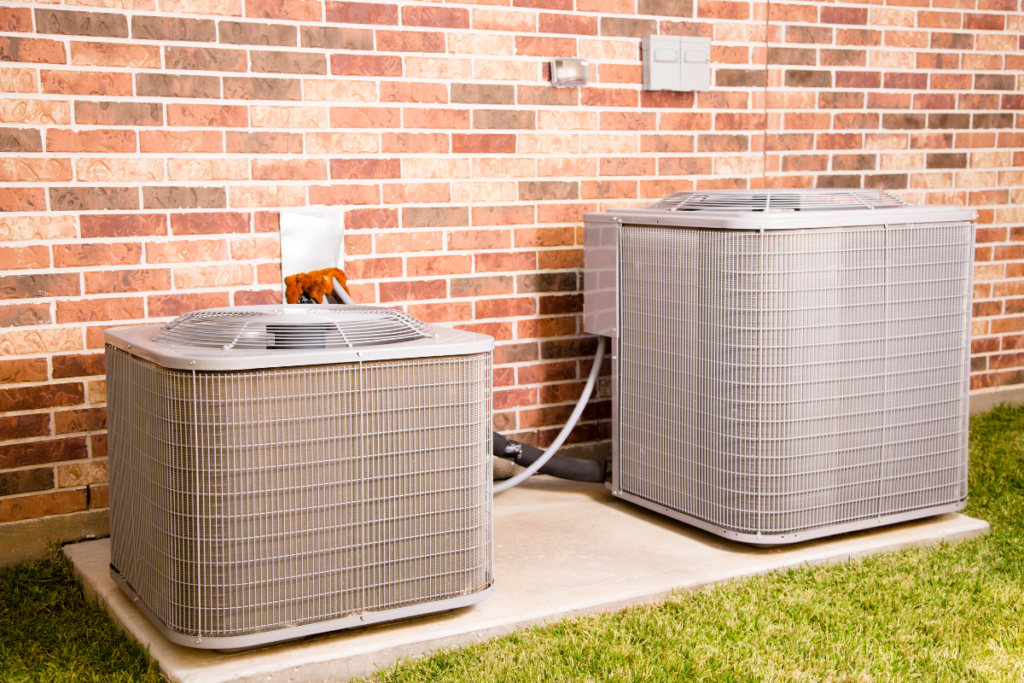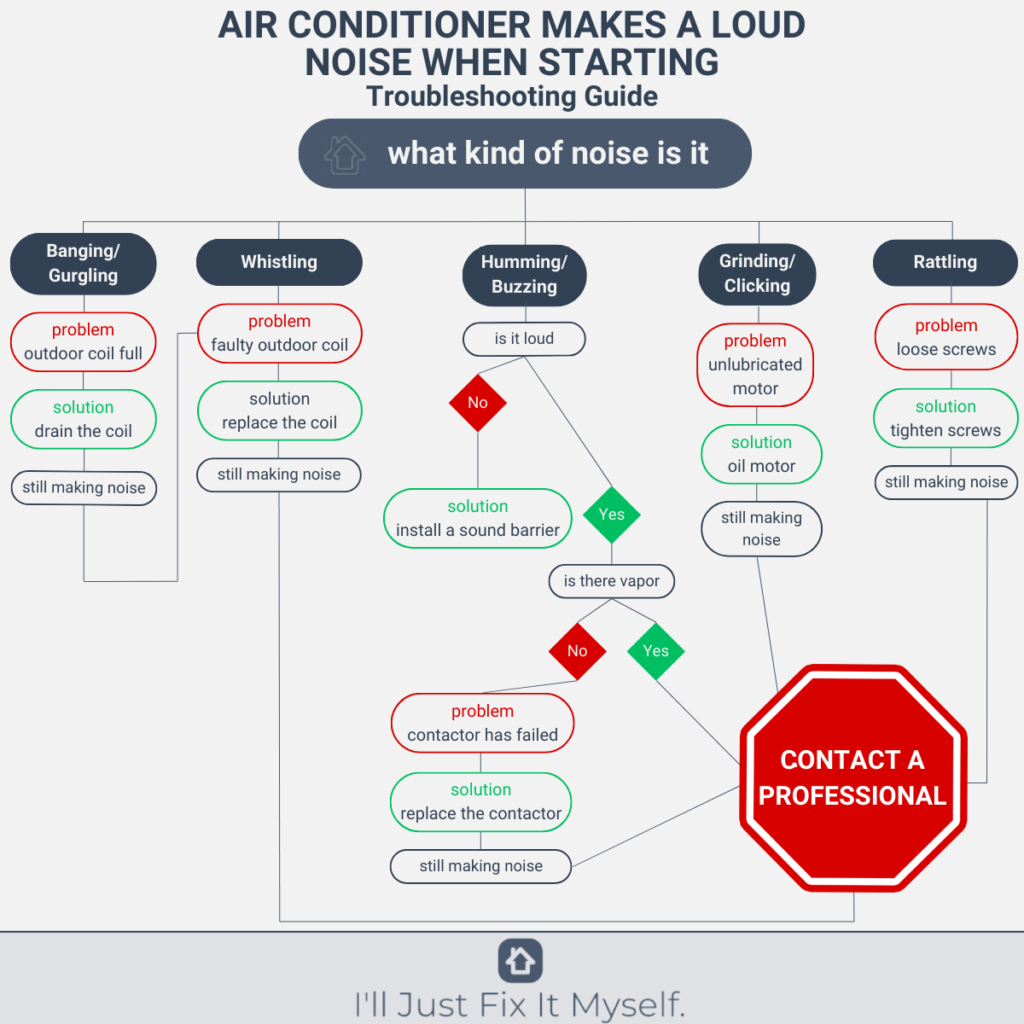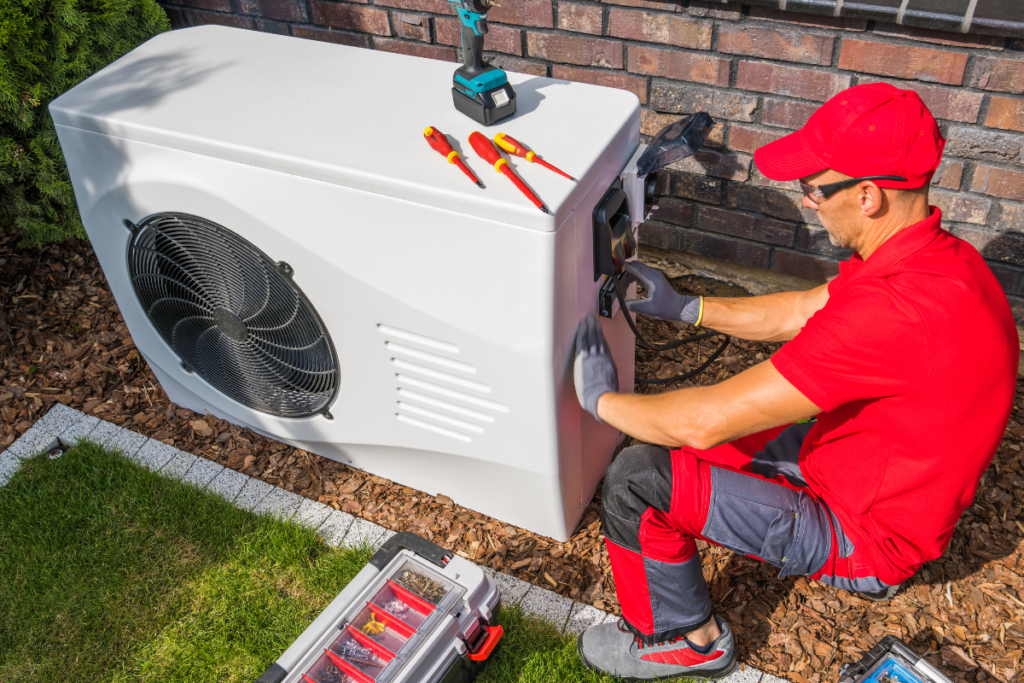Air Conditioner Makes Loud Noise When Starting? (6 Common Issues & Fixes)
Air conditioning units are present in over 100 million American homes, and it’s not uncommon for many of them to have an issue with their system, especially during the first hot days when the AC hasn’t been used for months or at the peak of summer when it’s been going nonstop for weeks. Given how important air conditioning is to our lives (or at least our comfort), what do you do when the air conditioner makes a loud noise when starting?
Air conditioners aren’t always quiet, but if yours has started making loud noises when it starts up, that’s a good sign it’s in need of maintenance. Solve rattling sounds by tightening loose screws, soothe gurgling noises by draining the outdoor coil, and relieve a grinding sound by oiling the motor. Other problems may require professional support.
Keep reading to learn all about the sounds your AC unit might make, when you should be worried, and what to do about them.
Is it normal if an air conditioner makes loud noise when starting up?
A heating, ventilation, and air conditioning (commonly called an HVAC) system is essential in most modern homes, and for good reason. It keeps the house cool during the summer months, warm in the winter, and helps circulate clean air throughout the house in the intervening months.
Some people may think that it is abnormal for an air conditioning unit to make any noise, but in reality, most AC units produce some kind of noise.
Most air conditioners make some noise; the model and age of the system may mean some units are louder than others. Typical noises such as clicking, whirring, and buzzing are normal and not a cause for concern.
However, if your air conditioner has started making unfamiliar noises when it turns off or if you just think it doesn’t sound right, there may be cause for concern.

Why is noise coming from my air conditioner when it starts?
Typically your air conditioner will make a noise when it’s starting up, but this is likely to sound more like a whirring, although it may be much louder if you’re standing next to the exterior unit when it turns on. If your AC has started making an unexpectedly loud noise when started up, there are several potential issues that may require your attention.
An air conditioner may make a loud noise when starting up because:
- The condenser fan is not hooked up properly to the compressor, causing it to make a noise each time the fan moves. The noise will be more prominent when you start the AC and the fan begins powering up.
- The pressure switch is malfunctioning and needs to be replaced.
- A gasket or seal on your outdoor unit needs to be replaced.
It all boils down to the air conditioner having issues in operation or some parts. Depending on your confidence level, there is some maintenance and repair work on your air conditioner that you can do yourself.
Some issues, however, will require you to get the help of a professional HVAC technician. Attempting to solve the problems yourself might only make it worse.
With that out of the way, let’s look at some other common fixes you can do to ensure your air conditioner isn’t making too much noise when you start it.
What noises does an HVAC (air conditioner) typically make?
When your air conditioner kicks on, it creates a special refrigerant gas (compressor agent) that gets pumped to the roof, where it’s dropped into a cooling coil. This cycle repeatedly happens so that you can keep your home cool throughout the season.
But what if this sound isn’t normal? Your air conditioner might make sounds that don’t seem to fit your air conditioning cycle.

You can either hear the fan going but not much else or maybe even some rattling in the machine. If this is happening consistently, it could indicate that there is something wrong with your system, most likely a loose fan, a sign of electrical problems, you have debris moving around, or other issues.
Something might be wrong if you’re hearing:
- Grinding or clicking
- Banging or gurgling
- Humming or buzzing (soft)
- Humming or buzzing (loud)
- Whistling
Some parts of an air conditioner are noisier than others, and it’s essential to know the difference between normal and abnormal sounds.
Air conditioner makes Grinding Noise or clicking sounds
Slight grinding noises typically mean that your compressor is working correctly. These may be hard to hear when you’re in another room, but that’s a big problem if they stop entirely.
Clicking noises are your condenser fan at work. It produces such sounds as it cools or heats the system’s components and attached ductwork. Most times, you can hear this sound from other rooms if the fan is working hard.
The problem comes in when you hear this clicking sound as you turn the air conditioner on. That will most likely point to electrical issues.
Unfortunately, you shouldn’t attempt to repair electrical issues in your air conditioner unless you’re a certified electrician or HVAC professional. Otherwise, you risk voiding any warranty or doing more damage to the unit.
How to Fix It: Consult an HVAC professional. Attempting to repair it yourself could leave you with more losses as you might damage the AC.
Banging or gurgling sounds from the plumbing
If you hear loud banging or gurgling sounds when you start the AC, the outdoor coil may be full of water. You might also notice a puddle outside your unit if this happens.
This problem can develop because dirt is clogging the drain line or the condensation pump has stopped working.
Sometimes you might notice a gurgling or pulsating sound whenever you start your AC. That could be because there is a collapsed or broken-down drain line. The collapsing creates a vacuum in the unit and will cause water to bubble or gurgle.
How to fix It: Drain the coil of the water that might clog it up. It is usual for the condensation to build up here. Therefore, draining it will stop the gurgling and banging sound.
Humming or buzzing (soft) from the outdoor fan
A constant humming or buzzing sound is a common issue with most air conditioners, but it doesn’t necessarily mean that something is wrong.
The noise comes from a fan inside the unit called a condenser fan. It has to operate at all times to pull heat from your home and expel it outside.
How to fix it: Chances are this sound is from the proper running of the air conditioner. If it’s bothersome, you may want to consider putting in a sound barrier. Many people plant bushes around their HVAC unit and home foundation area to help reduce the noise.
Air conditioner makes buzzing noise when starting (loud)
If, however, the humming or buzzing sound coming from your outdoor fan is particularly loud or came on suddenly, you may have a problem.
A humming or buzzing sound may result from a problem with the contactor (the part that controls your compressor).
This issue can be hard to diagnose, but it may be worth a look. If you’re electrically minded, you can probably pick up a replacement part for around $30.
How to Fix It: If you hear this, have a professional inspect your system to ensure everything’s working correctly. You might need to replace the contactor if it’s malfunctioning or causing your system to trip.
Humming or buzzing with vapor
This is a little bit of a gray area as your condenser is likely to be running practically nonstop during the hottest months, meaning it’s going to get loud.
If, however, the noise is accompanied by vapor or odor, there’s a good chance something is going to need to be replaced soon.
In this case, shut off your unit immediately and call the HVAC technician. Nothing good will come of stressing the compressor more. In fact, a failing compressor motor will be a huge and expensive headache to deal with.
How to fix it: Don’t attempt to fix this one yourself. Contact an HVAC tech for support.
If the odor is coming from inside the house or from one specific vent, you might have one of these 8 problems.
Whistling sound
Most air conditioners make a sound like a very large fan or a small engine, but if yours starts to sound more like a whistle, chances are a faulty outdoor coil is to blame.
When refrigerant isn’t flowing correctly through the unit, the air gets trapped in pockets of insulation between pipes. As that air heats up, it expands and becomes an obstruction for cool liquid nearby leading to the whistling sound.
Unfortunately for keen DIYers, many of the problems with an air conditioner can only be solved by someone with extensive knowledge of the machine.
How to fix It: Get an HVAC technician to examine the air conditioner and solve the problem.
Is your air conditioning starting up them immediately stopping? Here are 8 tips for fixing the problem!
Common do-it-yourself fixes for loud outdoor unit air conditioners
While most extreme air conditioner issues will need to be dealt with by a professional, there are some small things that you can do to reduce noise and make your air conditioner run more efficiently.
Regular maintenance is the best way to make your air conditioner run more quietly, more efficiently, and for longer:
- Replace the filters
- Lubricate the motor
- Tighten loose screws
- Clean the fans
It may be annoying to have to remember to do several small tasks every year, but put it on your calendar anyway! Regular maintenance can save you serious time and money down the road!
Replace the filters
HVAC filters are one of the easiest elements of your system to maintain. Most of the time, you don’t even have to go outside!
Replace air filters every 90 days to reduce stress on the air conditioner’s compressor and improve the quality of the air in your home by filtering the air before it makes it to the indoor blower.
Contrary to what most people think, the air filters aren’t there for your benefit – they’re too keep dust from getting into the HVAC unit. Replace them regularly to keep your AC functioning at its peak.
Top tip: Most home improvement warehouses offer a discount if you buy several filters at a time. If you have a safe place to store the extras, you can save a few dollars by buying a year’s worth at a time!
Clean the fans
Dirty fans are another significant cause of noise in air conditioners which is why regular cleaning should be a part of your maintenance schedule.
You will need to open the AC to know if it’s the dirt causing any issues. If you find any debris inside the fan or other parts of the AC, clean them and remove the dirt inside. A soft cleaning brush will often come in handy here.
Another part of the AC to give special attention are the coil fins. If this gets dirty, then the AC will also produce noise when starting and running. Check it and clean it if it has any dirt.
Lubricate the motor
An unlubricated motor will produce loud grinding noises whenever the AC is in use. Such noises can be pretty irritating, which is why you need to fix them by lubricating the motor.
Oiling the motor will help reduce such noises and have your AC working silently.
It’s a good practice to perform this annually, preferably before the heavy use of summer.
Tighten loose screws
Loose screws in any machine will be responsible for loud rattling sounds. That’s why it’s a good idea to examine the screws each time you have rattling sounds from your AC. Tightening these screws will help get rid of the noise coming from the unit.
The screws hold several parts, like the fan or blade. When loose, they can cause loud rattling sounds. These sounds might occur when the air conditioner is starting or even when it is running.
If a loose screw rattles out completely, it could also cause major damage to the unit. Again, regular maintenance is the key here!
Arrange regular inspections
Regular inspections can help detect problems before they occur.
Schedule a maintenance inspection once or twice a year to keep your HVAC in good working order.

Any flaws in the system can be identified by an HVAC professional, who can also recommend necessary repairs.
Frequently Asked Questions
How do you fix a noisy air conditioner?
A noisy air conditioner will require you to examine all its parts for issues and fix them. If it has loose screws, tighten them, dirty fans, and clean them. Some other times the unit noise won’t be that loud and will be the fan working.
Do quieter air conditioners exist?
Certain types of air conditioners are much quieter than others as they use sound dampeners that ensure they aren’t as loud as traditional air conditioners.
If you can’t stand the noise from your current air conditioner, getting a quieter one may help.
Given the cost of replacing an HVAC unit, you may also want to consider installing a sound barrier.
What are the symptoms of a bad AC compressor?
If your AC compressor is not running properly, it could be causing some pretty serious symptoms.
You can tell your air conditioner compressor isn’t working by the:
Humidity – If your AC isn’t working properly, it won’t be able to send enough air to cool down your home in hot weather. This can cause high humidity levels, which can make you feel like you’re suffocating.
Noise – A bad AC compressor can also cause lots of noise when it’s working. This is because the unit is trying to create a lot of pressure and winds up making a lot of noise as a result.
Poor air quality – If your AC compressor isn’t working well, it will likely produce poorer-quality air than usual.
Is all noise from an air conditioner an issue with the machine?
Not all noise is because the air conditioner has an issue. Some sounds are normal operational sounds. For instance, the air conditioner might produce a slow humming sound that merely shows that it is working right.
Final thoughts on air conditioner noise
A loud noise is one of the top five common air conditioner problems, but some of the issues have an easy fix!
If your AC is rattling, chances are you have some screws that need tightening. If there are wet, gurgling noises from the unit, you may need to drain the outdoor coil. A grinding sound means the HVAC motor needs lubricant.
If the problem is beyond your comfort level, it’s important to have an HVAC technician you trust. Once you find one you like, keep his card!
Let Us Know How We’re Doing!
Did this expertly prepared resource answer your question?
Do you have another question about home maintenance, home improvement projects, home appliance repair, or something else?
Get more information, send in questions and keep the discussion going by contacting the I’ll Just Fix It Myself company customer service team at at 1-800-928-1490 or Email us at [email protected]
